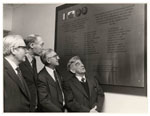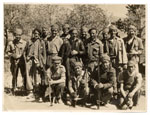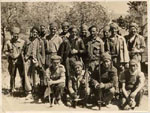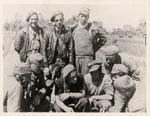 |
| You are here: Cwm > Themes > Life > International Relations > : Spanish Civil War | |
 | |
|
Spanish Civil War |
|
|
|
|
|
In 1930, the military dictatorship of Primo de Rivera was overthrown and Spain became a Republic. The government attacked the Catholic Church, removing its control of education and nationalizing church property.
This alienated parts of Spanish opinion and led to a right wing collation victory in the elections in 1933, along with a general strike and the declaration of Catalan Independence in 1934 (although this was crushed). In the 1936 elections, the left wing Popular Front were victorious.
Although they promised land reform, events were out of control and peasants divided estates themselves, and churches and convents were burnt. The Spanish Army felt that their survival was under threat. This lead to the commander of the Spanish Army based in Morocco, General Francisco Franco, issuing a proclamation on the 18th July 1936, setting up an alternative government. The coup failed to overthrow the government because not all army units were prepared to rebel, the coup and ensuring split led directly to the outbreak of the civil war. Franco and the Nationalists, supported by Germany and Italy, presented the civil war as a struggle against communism. The Popular Front, supported by Stalin, viewed it as a battle between democracy and fascism. Britain and France, in an attempt to appease Mussolini and Hitler and prevent a general European war, impeded the Republican war effort by using their navies to prevent supplies reaching them. While they followed a policy of non-invention, individuals in these countries who felt strongly in freedom, democracy and the defence of the Republic, went to Spain to be recruited in the International Brigade. The International Brigade numbered 40 000 and was a combination of intellectuals, industrial workers and political activists. Of the 174 that went from Wales, 118 were from the mining valleys of South Wales. By the end of 1936, Franco held over half of Spain, mostly in the south and west, whilst the Republicans, based in Valencia, held eastern and southeastern Spain, and most of the industrial northern coastline. In November 1936, Germany and Italy officially recognised Franco government and expected victory. In 1937 however, the first International Brigade arrived and defeated an attempt by the Italian troops on behalf of Franco to capture Madrid. Franco turned to the Northern regions; the republicans moved to Barcelona and defeated the Nationalists at Teruel. Having each taken strong points of the other side, a stalemate was reached at the end of 1937. In 1938, this was broken by huge military aid from Italy and Germany and disagreements amongst the republicans. Franco advanced and by started attacking Barcelona and Madrid, the last strongholds of the republicans. The cities held out against his bombing until early 1939, and the war ended in victory for Franco and the Nationalists. Spain became the third pro-fascist power on the borders of France, and therefore the power of balance in Europe was altered in favour of the Third Reich.
FURTHER READING: Beevor, Anthony. The Spanish Civil War. (London, 2001). Bell, Adrian. Only for Three Months: The Basque Children in Exile. (Biggleswade, 1996). Carr, Raymond. Images of the Spanish Civil War (Allan and Unwin, 1986). Felstead, Richard. No other way: Jack Russia and the Spanish Civil War. (Alun books, 1981). Francis, Hywel. Miners against Fascism: Wales and the Spanish Civil War. (Lawrence and Wishart,1984). Stradling, Rob. Cardiff and the Spanish Civil War. (Cardiff, 1996) LINKS TO USEFUL WEBSITES: Imperial War Museum Interviews with men who served in Spain. Ammanford Private/local site giving details of three Ammanford miners who went to the Spanish Civil War reasons why and how they tried to stow away on a Spanish Ship.
|
|
Swansea University Special Collections
| ©University of Wales Swansea 2008 |











